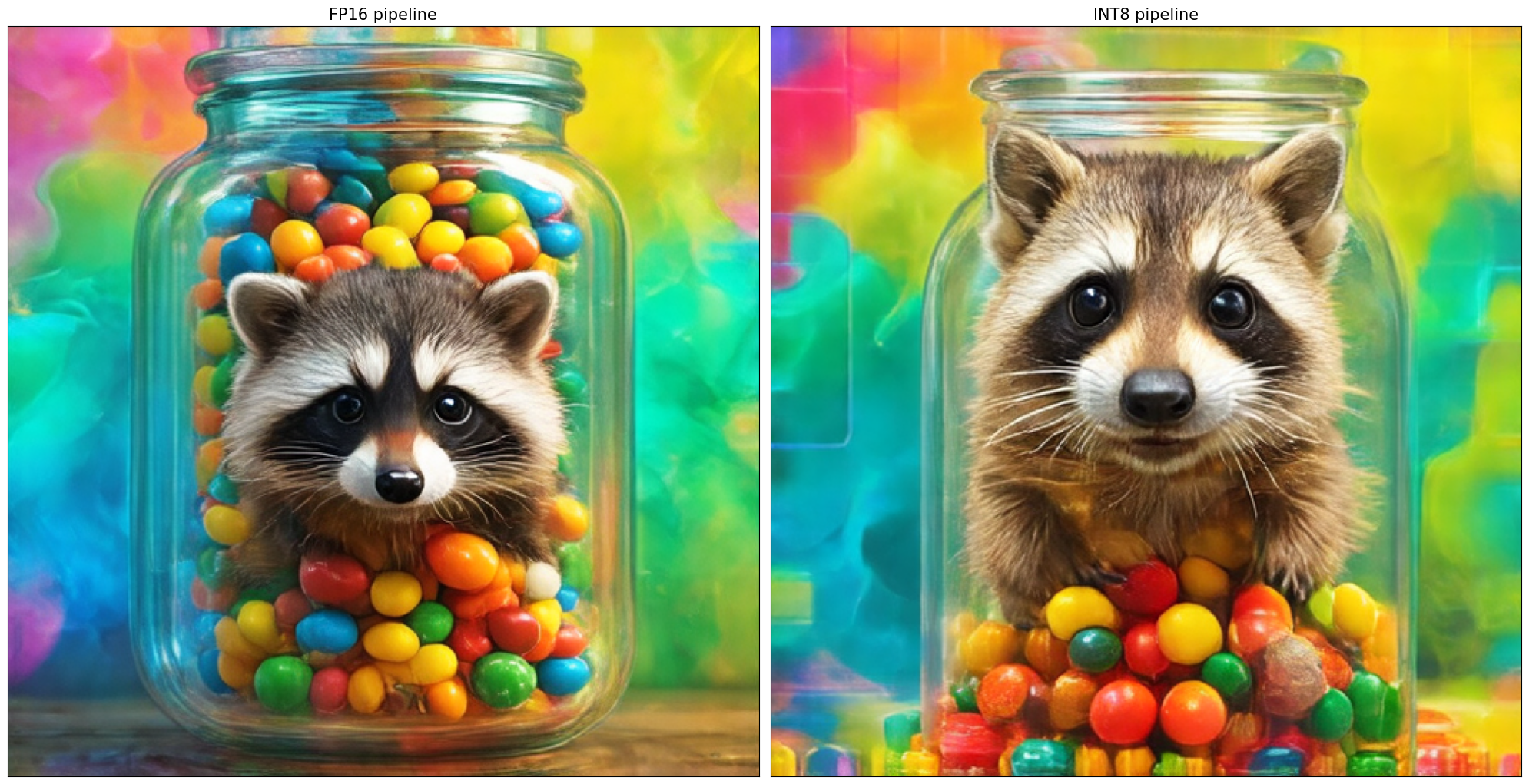Image generation with Stable Diffusion v3 and OpenVINO#
This Jupyter notebook can be launched after a local installation only.
Stable Diffusion V3 is next generation of latent diffusion image Stable Diffusion models family that outperforms state-of-the-art text-to-image generation systems in typography and prompt adherence, based on human preference evaluations. In comparison with previous versions, it based on Multimodal Diffusion Transformer (MMDiT) text-to-image model that features greatly improved performance in image quality, typography, complex prompt understanding, and resource-efficiency.
mmdit.png#
More details about model can be found in model card, research paper and Stability.AI blog post. In this tutorial, we will consider how to convert Stable Diffusion v3 for running with OpenVINO. An additional part demonstrates how to run optimization with NNCF to speed up pipeline. If you want to run previous Stable Diffusion versions, please check our other notebooks:
Table of contents:
Installation Instructions#
This is a self-contained example that relies solely on its own code.
We recommend running the notebook in a virtual environment. You only need a Jupyter server to start. For details, please refer to Installation Guide.
Prerequisites#
%pip install -q "git+https://github.com/initml/diffusers.git@clement/feature/flash_sd3" "gradio>=4.19" "torch>=2.1" "transformers" "nncf>=2.12.0" "datasets>=2.14.6" "opencv-python" "pillow" "peft>=0.7.0" --extra-index-url https://download.pytorch.org/whl/cpu
%pip install -qU "openvino>=2024.3.0"
import requests
from pathlib import Path
if not Path("sd3_helper.py").exists():
r = requests.get(url="https://raw.githubusercontent.com/openvinotoolkit/openvino_notebooks/latest/notebooks/stable-diffusion-v3/sd3_helper.py")
open("sd3_helper.py", "w").write(r.text)
if not Path("sd3_quantization_helper.py").exists():
r = requests.get(url="https://raw.githubusercontent.com/openvinotoolkit/openvino_notebooks/latest/notebooks/stable-diffusion-v3/sd3_quantization_helper.py")
open("sd3_quantization_helper.py", "w").write(r.text)
if not Path("gradio_helper.py").exists():
r = requests.get(url="https://raw.githubusercontent.com/openvinotoolkit/openvino_notebooks/latest/notebooks/stable-diffusion-v3/gradio_helper.py")
open("gradio_helper.py", "w").write(r.text)
if not Path("notebook_utils.py").exists():
r = requests.get(url="https://raw.githubusercontent.com/openvinotoolkit/openvino_notebooks/latest/utils/notebook_utils.py")
open("notebook_utils.py", "w").write(r.text)
Build PyTorch pipeline#
Note: run model with notebook, you will need to accept license agreement. You must be a registered user in Hugging Face Hub. Please visit HuggingFace model card, carefully read terms of usage and click accept button. You will need to use an access token for the code below to run. For more information on access tokens, refer to this section of the documentation. You can login on Hugging Face Hub in notebook environment, using following code:
# uncomment these lines to login to huggingfacehub to get access to pretrained model
# from huggingface_hub import notebook_login, whoami
# try:
# whoami()
# print('Authorization token already provided')
# except OSError:
# notebook_login()
We will use Diffusers library integration for running Stable Diffusion v3 model. You can find more details in Diffusers documentation. Additionally, we can apply optimization for pipeline performance and memory consumption:
Use flash SD3. Flash Diffusion is a diffusion distillation method proposed in Flash Diffusion: Accelerating Any Conditional Diffusion Model for Few Steps Image Generation. The model represented as a 90.4M LoRA distilled version of SD3 model that is able to generate 1024x1024 images in 4 steps. If you want disable it, you can unset checkbox Use flash SD3
Remove T5 text encoder. Removing the memory-intensive 4.7B parameter T5-XXL text encoder during inference can significantly decrease the memory requirements for SD3 with only a slight loss in performance. If you want to use this model in pipeline, please set use t5 text encoder checkbox.
from sd3_helper import get_pipeline_options
pt_pipeline_options, use_flash_lora, load_t5 = get_pipeline_options()
display(pt_pipeline_options)
/home/ea/work/my_optimum_intel/optimum_env/lib/python3.8/site-packages/diffusers/models/transformers/transformer_2d.py:34: FutureWarning: Transformer2DModelOutput is deprecated and will be removed in version 1.0.0. Importing Transformer2DModelOutput from diffusers.models.transformer_2d is deprecated and this will be removed in a future version. Please use from diffusers.models.modeling_outputs import Transformer2DModelOutput, instead.
deprecate("Transformer2DModelOutput", "1.0.0", deprecation_message)
2024-08-08 08:15:46.648328: I tensorflow/core/util/port.cc:110] oneDNN custom operations are on. You may see slightly different numerical results due to floating-point round-off errors from different computation orders. To turn them off, set the environment variable TF_ENABLE_ONEDNN_OPTS=0.
2024-08-08 08:15:46.650527: I tensorflow/tsl/cuda/cudart_stub.cc:28] Could not find cuda drivers on your machine, GPU will not be used.
2024-08-08 08:15:46.687530: I tensorflow/core/platform/cpu_feature_guard.cc:182] This TensorFlow binary is optimized to use available CPU instructions in performance-critical operations.
To enable the following instructions: AVX2 AVX512F AVX512_VNNI FMA, in other operations, rebuild TensorFlow with the appropriate compiler flags.
2024-08-08 08:15:47.368728: W tensorflow/compiler/tf2tensorrt/utils/py_utils.cc:38] TF-TRT Warning: Could not find TensorRT
VBox(children=(Checkbox(value=True, description='Use flash SD3'), Checkbox(value=False, description='Use t5 te…
Convert models with OpenVINO#
Starting from 2023.0 release, OpenVINO supports PyTorch models directly
via Model Conversion API. ov.convert_model function accepts instance
of PyTorch model and example inputs for tracing and returns object of
ov.Model class, ready to use or save on disk using ov.save_model
function.
The pipeline consists of four important parts:
Clip and T5 Text Encoders to create condition to generate an image from a text prompt.
Transformer for step-by-step denoising latent image representation.
Autoencoder (VAE) for decoding latent space to image.
We will use convert_sd3 helper function defined in
sd3_helper.py that create original PyTorch model
and convert each part of pipeline using ov.convert_model.
from sd3_helper import convert_sd3
# Uncomment the line beolow to see model conversion code
# ??convert_sd3
convert_sd3(load_t5.value, use_flash_lora.value)
SD3 model already converted
Prepare OpenVINO inference pipeline#
from sd3_helper import OVStableDiffusion3Pipeline, init_pipeline # noqa: F401
# Uncomment line below to see pipeline code
# ??OVStableDiffusion3Pipeline
Run OpenVINO model#
from notebook_utils import device_widget
device = device_widget()
device
Dropdown(description='Device:', index=1, options=('CPU', 'AUTO'), value='AUTO')
from sd3_helper import TEXT_ENCODER_PATH, TEXT_ENCODER_2_PATH, TEXT_ENCODER_3_PATH, TRANSFORMER_PATH, VAE_DECODER_PATH
models_dict = {"transformer": TRANSFORMER_PATH, "vae": VAE_DECODER_PATH, "text_encoder": TEXT_ENCODER_PATH, "text_encoder_2": TEXT_ENCODER_2_PATH}
if load_t5.value:
models_dict["text_encoder_3"] = TEXT_ENCODER_3_PATH
ov_pipe = init_pipeline(models_dict, device.value, use_flash_lora.value)
Models compilation
transformer - Done!
vae - Done!
text_encoder - Done!
text_encoder_2 - Done!
import torch
image = ov_pipe(
"A raccoon trapped inside a glass jar full of colorful candies, the background is steamy with vivid colors",
negative_prompt="",
num_inference_steps=28 if not use_flash_lora.value else 4,
guidance_scale=5 if not use_flash_lora.value else 0,
height=512,
width=512,
generator=torch.Generator().manual_seed(141),
).images[0]
image
0%| | 0/4 [00:00<?, ?it/s]

Quantization#
NNCF enables
post-training quantization by adding quantization layers into model
graph and then using a subset of the training dataset to initialize the
parameters of these additional quantization layers. Quantized operations
are executed in INT8 instead of FP32/FP16 making model
inference faster.
According to OVStableDiffusion3Pipeline structure, the
transformer model takes up significant portion of the overall
pipeline execution time. Now we will show you how to optimize the UNet
part using NNCF to reduce
computation cost and speed up the pipeline. Quantizing the rest of the
pipeline does not significantly improve inference performance but can
lead to a substantial degradation of accuracy. That’s why we use 4-bit
weight compression for the rest of the pipeline to reduce memory
footprint.
Please select below whether you would like to run quantization to improve model inference speed.
NOTE: Quantization is time and memory consuming operation. Running quantization code below may take some time.
from notebook_utils import quantization_widget
from sd3_quantization_helper import TRANSFORMER_INT8_PATH, TEXT_ENCODER_INT4_PATH, TEXT_ENCODER_2_INT4_PATH, TEXT_ENCODER_3_INT4_PATH, VAE_DECODER_INT4_PATH
to_quantize = quantization_widget()
to_quantize
huggingface/tokenizers: The current process just got forked, after parallelism has already been used. Disabling parallelism to avoid deadlocks...
To disable this warning, you can either:
- Avoid using tokenizers before the fork if possible
- Explicitly set the environment variable TOKENIZERS_PARALLELISM=(true | false)
INFO:nncf:NNCF initialized successfully. Supported frameworks detected: torch, tensorflow, onnx, openvino
Checkbox(value=True, description='Quantization')
Let’s load skip magic extension to skip quantization if
to_quantize is not selected
# Fetch `skip_kernel_extension` module
import requests
r = requests.get(
url="https://raw.githubusercontent.com/openvinotoolkit/openvino_notebooks/latest/utils/skip_kernel_extension.py",
)
open("skip_kernel_extension.py", "w").write(r.text)
optimized_pipe = None
opt_models_dict = {
"transformer": TRANSFORMER_INT8_PATH,
"text_encoder": TEXT_ENCODER_INT4_PATH,
"text_encoder_2": TEXT_ENCODER_2_INT4_PATH,
"vae": VAE_DECODER_INT4_PATH,
}
if TEXT_ENCODER_3_PATH.exists():
opt_models_dict["text_encoder_3"] = TEXT_ENCODER_3_INT4_PATH
%load_ext skip_kernel_extension
Prepare calibration dataset#
We use a portion of google-research-datasets/conceptual_captions dataset from Hugging Face as calibration data. We use prompts below to guide image generation and to determine what not to include in the resulting image.
To collect intermediate model inputs for calibration we should customize
CompiledModel. We should set the height and width of the image to
512 to reduce memory consumption during quantization.
%%skip not $to_quantize.value
from sd3_quantization_helper import collect_calibration_data, TRANSFORMER_INT8_PATH
# Uncomment the line to see calibration data collection code
# ??collect_calibration_data
Run Quantization#
Quantization of the first Convolution layer impacts the generation
results. We recommend using IgnoredScope to keep accuracy sensitive
layers in FP16 precision.
%%skip not $to_quantize.value
import nncf
import gc
import openvino as ov
core = ov.Core()
if not TRANSFORMER_INT8_PATH.exists():
calibration_dataset_size = 200
print("Calibration data collection started")
unet_calibration_data = collect_calibration_data(ov_pipe,
calibration_dataset_size=calibration_dataset_size,
num_inference_steps=28 if not use_flash_lora.value else 4,
guidance_scale=5 if not use_flash_lora.value else 0
)
print("Calibration data collection finished")
del ov_pipe
gc.collect()
ov_pipe = None
transformer = core.read_model(TRANSFORMER_PATH)
quantized_model = nncf.quantize(
model=transformer,
calibration_dataset=nncf.Dataset(unet_calibration_data),
subset_size=calibration_dataset_size,
model_type=nncf.ModelType.TRANSFORMER,
ignored_scope=nncf.IgnoredScope(names=["__module.model.base_model.model.pos_embed.proj.base_layer/aten::_convolution/Convolution"]),
)
ov.save_model(quantized_model, TRANSFORMER_INT8_PATH)
Run Weights Compression#
Quantizing of the Text Encoders and Autoencoder does not
significantly improve inference performance but can lead to a
substantial degradation of accuracy.
For reducing model memory consumption we will use weights compression. The Weights Compression algorithm is aimed at compressing the weights of the models and can be used to optimize the model footprint and performance of large models where the size of weights is relatively larger than the size of activations, for example, Large Language Models (LLM). Compared to INT8 compression, INT4 compression improves performance even more, but introduces a minor drop in prediction quality.
%%skip not $to_quantize.value
from sd3_quantization_helper import compress_models
compress_models()
Compressed text_encoder can be found in stable-diffusion-3/text_encoder_int4.xml
Compressed text_encoder_2 can be found in stable-diffusion-3/text_encoder_2_int4.xml
Compressed vae_decoder can be found in stable-diffusion-3/vae_decoder_int4.xml
Let’s compare the images generated by the original and optimized pipelines.
%%skip not $to_quantize.value
optimized_pipe = init_pipeline(opt_models_dict, device.value, use_flash_lora.value)
Models compilation
transformer - Done!
text_encoder - Done!
text_encoder_2 - Done!
vae - Done!
%%skip not $to_quantize.value
from sd3_quantization_helper import visualize_results
opt_image = optimized_pipe(
"A raccoon trapped inside a glass jar full of colorful candies, the background is steamy with vivid colors",
negative_prompt="",
num_inference_steps=28 if not use_flash_lora.value else 4,
guidance_scale=5 if not use_flash_lora.value else 0,
height=512,
width=512,
generator=torch.Generator().manual_seed(141),
).images[0]
visualize_results(image, opt_image)
0%| | 0/4 [00:00<?, ?it/s]

Compare model file sizes#
%%skip not $to_quantize.value
from sd3_quantization_helper import compare_models_size
del optimized_pipe
gc.collect()
compare_models_size()
transformer compression rate: 1.939
text_encoder compression rate: 2.714
text_encoder_2 compression rate: 3.057
vae_decoder compression rate: 2.007
Compare inference time of the FP16 and optimized pipelines#
To measure the inference performance of the FP16 and optimized
pipelines, we use mean inference time on 5 samples.
NOTE: For the most accurate performance estimation, it is recommended to run
benchmark_appin a terminal/command prompt after closing other applications.
%%skip not $to_quantize.value
from sd3_quantization_helper import compare_perf
compare_perf(models_dict, opt_models_dict, device.value, use_flash_lora.value, validation_size=5)
Load FP16 pipeline
Models compilation
transformer - Done!
vae - Done!
text_encoder - Done!
text_encoder_2 - Done!
Load Optimized pipeline
Models compilation
transformer - Done!
text_encoder - Done!
text_encoder_2 - Done!
vae - Done!
Performance speed-up: 1.540
Interactive demo#
Please select below whether you would like to use the quantized models to launch the interactive demo.
from sd3_helper import get_pipeline_selection_option
use_quantized_models = get_pipeline_selection_option(opt_models_dict)
use_quantized_models
Checkbox(value=True, description='Use quantized models')
from gradio_helper import make_demo
ov_pipe = init_pipeline(models_dict if not use_quantized_models.value else opt_models_dict, device.value, use_flash_lora.value)
demo = make_demo(ov_pipe, use_flash_lora.value)
# if you are launching remotely, specify server_name and server_port
# demo.launch(server_name='your server name', server_port='server port in int')
# if you have any issue to launch on your platform, you can pass share=True to launch method:
# demo.launch(share=True)
# it creates a publicly shareable link for the interface. Read more in the docs: https://gradio.app/docs/
try:
demo.launch(debug=False)
except Exception:
demo.launch(debug=False, share=True)